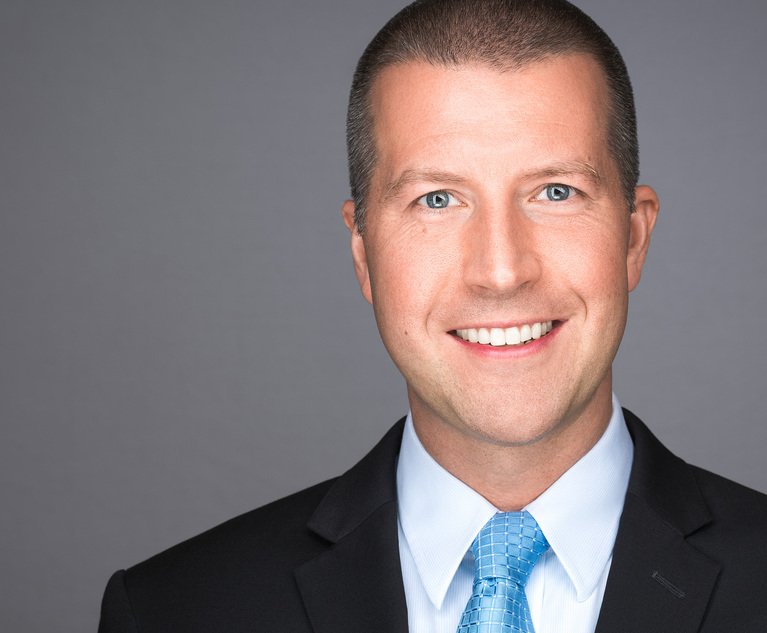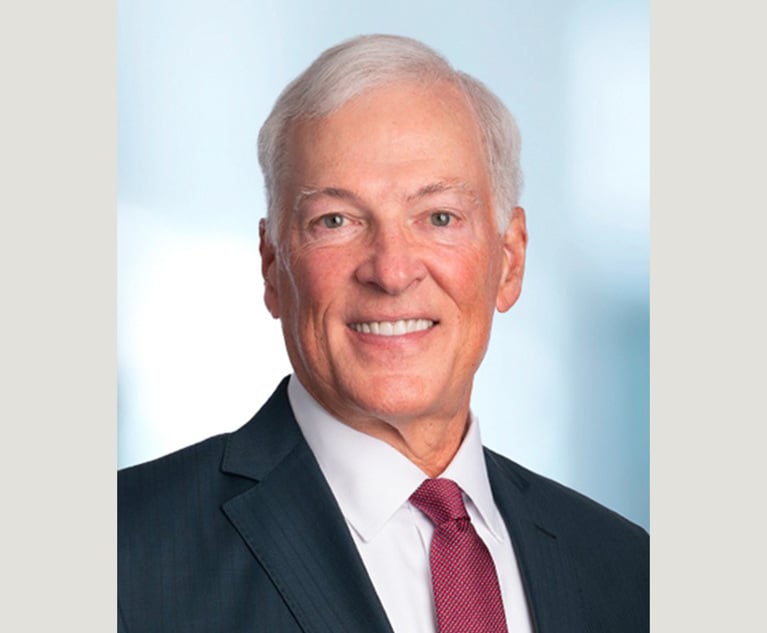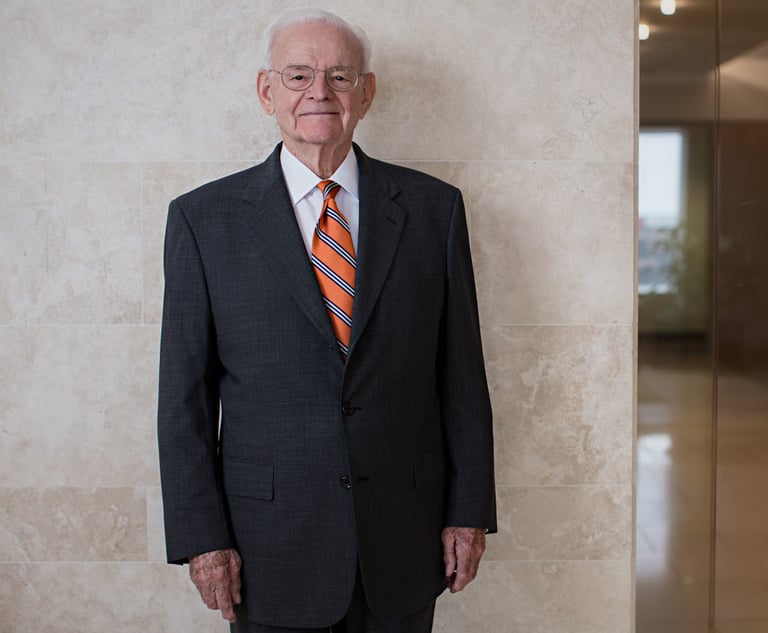 Thomas McCabe is a judicial candidate for the Chester County Court of Common Pleas. Courtesy photo
Thomas McCabe is a judicial candidate for the Chester County Court of Common Pleas. Courtesy photo Thomas McCabe Seeks Spot on Chester County Court of Common Pleas
A court's decision should recognize that the applied law impacts real people in concrete ways.
October 23, 2023 at 11:36 AM
4 minute read
Candidate: Thomas McCabe
Court: Chester County Court of Common Pleas
Party: Democrat
The following has been edited lightly for length and style.
The Legal Intelligencer: How would you describe your judicial philosophy?
Thomas McCabe: Pragmatic—it is important to remember that the litigants in front of the court are there advocating over their livelihoods, liberty and/or matters impacting their lives. A court's decision should recognize that the applied law impacts real people in concrete ways.
The Legal: What makes you the best candidate for the role?
McCabe: I am one of the best candidate's for the role of Court of Common Pleas judge as my career as a litigator in both criminal law and civil litigation make me uniquely qualified on the matters that come before the court. I have handled matters ranging from traffic tickets up through First Degree Homicide jury trials, appellate oral arguments, Orphans' Court litigation, land use/municipal matters, juvenile delinquency hearings, and civil bench trials. I am chair of the Chester County Bar Association's Criminal Defense Section and co-chair of the Civil Litigation Section, and I received the Chester County Bar Association's highest rating of "qualified." I am experienced in a wide range of practice areas, and ready to serve on day one.
The Legal: What is the greatest threat to the practice of law or problem the profession faces?
McCabe: The greatest threat to the practice of law is the perception of impartiality of the court – namely that the judge will not be impartial in his or her decisions. The judicial branch retains its importance, influence and authority, based largely on its credibility to render just decisions that are accepted as being fairly decided regardless of whether the litigant wins or loses.
The Legal: What does your party membership say about you and your legal outlook?
McCabe: As a Democrat, I believe in the Constitution, the rule of law and equality of all persons who come before the court and, if elected, would treat all litigants fairly and impartially.
The Legal: Do you think courts in Pennsylvania have a perception problem when it comes to appearing partisan or polarized? If so, what would you do to combat this?
McCabe: No.
The Legal: Several CLEs and bench-bar panels have recently addressed the growing phenomenon of distrust in the courts. In your view, how has distrust in the judiciary created challenges for the bench, and how should judges respond?
McCabe: Distrust in the judiciary creates the challenge for the bench that its decisions are not fairly and impartially rendered. Judges should respond by avoiding anything that would lend itself to the appearance of impropriety—and thus call into question the impartiality of the decisions made by the judge.
The Legal: What factors matter in deciding when recusal is necessary, and would you recuse yourself if a campaign contributor were involved in litigation as a party or attorney before you?
McCabe: The factors in deciding whether recusal is necessary include but are not limited to a personal connection with the litigant or attorney and the involvement of the litigant or attorney with the judge's campaign. With respect to recusing myself regarding campaign contributors being involved as a party or attorney, I would follow the judicial ethics guidelines and be sure to disclose the contribution and connection to all parties and attorneys involved before the court.
The Legal: Who are your role models and mentors?
McCabe: Former Chester County Public Defender John (Jack) Merrick—working in his office trained me to know the statutes, rules of procedure and case law cold, but to also keep an eye toward the practical impact on the client. The office culture was one of great comradery, where you worked together defending the Constitution for the indigent and by extension for society at large. My pragmatic legal philosophy stems directly from my experiences as an assistant public defender.
NOT FOR REPRINT
© 2025 ALM Global, LLC, All Rights Reserved. Request academic re-use from www.copyright.com. All other uses, submit a request to [email protected]. For more information visit Asset & Logo Licensing.
You Might Like
View All
Saxton & Stump Lands Newly Retired Ex-Chief Judge From Middle District of Pa.
3 minute read
'Discordant Dots': Why Phila. Zantac Judge Rejected Bid for His Recusal
3 minute read
Judge Louis C. Bechtle: An American Jurist Who Relied on Common Sense, Sound Judgment and Fairness
5 minute read
Samuel M. Lehrer, Retired Philadelphia Court of Common Pleas Judge, Dies
1 minute readTrending Stories
- 1Reviewing Judge Merchan's Unconditional Discharge
- 2With New Civil Jury Selection Rule, Litigants Should Carefully Weigh Waiver Risks
- 3Young Lawyers Become Old(er) Lawyers
- 4Caught In the In Between: A Legal Roadmap for the Sandwich Generation
- 5Top 10 Developments, Lessons, and Reminders of 2024
Who Got The Work
J. Brugh Lower of Gibbons has entered an appearance for industrial equipment supplier Devco Corporation in a pending trademark infringement lawsuit. The suit, accusing the defendant of selling knock-off Graco products, was filed Dec. 18 in New Jersey District Court by Rivkin Radler on behalf of Graco Inc. and Graco Minnesota. The case, assigned to U.S. District Judge Zahid N. Quraishi, is 3:24-cv-11294, Graco Inc. et al v. Devco Corporation.
Who Got The Work
Rebecca Maller-Stein and Kent A. Yalowitz of Arnold & Porter Kaye Scholer have entered their appearances for Hanaco Venture Capital and its executives, Lior Prosor and David Frankel, in a pending securities lawsuit. The action, filed on Dec. 24 in New York Southern District Court by Zell, Aron & Co. on behalf of Goldeneye Advisors, accuses the defendants of negligently and fraudulently managing the plaintiff's $1 million investment. The case, assigned to U.S. District Judge Vernon S. Broderick, is 1:24-cv-09918, Goldeneye Advisors, LLC v. Hanaco Venture Capital, Ltd. et al.
Who Got The Work
Attorneys from A&O Shearman has stepped in as defense counsel for Toronto-Dominion Bank and other defendants in a pending securities class action. The suit, filed Dec. 11 in New York Southern District Court by Bleichmar Fonti & Auld, accuses the defendants of concealing the bank's 'pervasive' deficiencies in regards to its compliance with the Bank Secrecy Act and the quality of its anti-money laundering controls. The case, assigned to U.S. District Judge Arun Subramanian, is 1:24-cv-09445, Gonzalez v. The Toronto-Dominion Bank et al.
Who Got The Work
Crown Castle International, a Pennsylvania company providing shared communications infrastructure, has turned to Luke D. Wolf of Gordon Rees Scully Mansukhani to fend off a pending breach-of-contract lawsuit. The court action, filed Nov. 25 in Michigan Eastern District Court by Hooper Hathaway PC on behalf of The Town Residences LLC, accuses Crown Castle of failing to transfer approximately $30,000 in utility payments from T-Mobile in breach of a roof-top lease and assignment agreement. The case, assigned to U.S. District Judge Susan K. Declercq, is 2:24-cv-13131, The Town Residences LLC v. T-Mobile US, Inc. et al.
Who Got The Work
Wilfred P. Coronato and Daniel M. Schwartz of McCarter & English have stepped in as defense counsel to Electrolux Home Products Inc. in a pending product liability lawsuit. The court action, filed Nov. 26 in New York Eastern District Court by Poulos Lopiccolo PC and Nagel Rice LLP on behalf of David Stern, alleges that the defendant's refrigerators’ drawers and shelving repeatedly break and fall apart within months after purchase. The case, assigned to U.S. District Judge Joan M. Azrack, is 2:24-cv-08204, Stern v. Electrolux Home Products, Inc.
Featured Firms
Law Offices of Gary Martin Hays & Associates, P.C.
(470) 294-1674
Law Offices of Mark E. Salomone
(857) 444-6468
Smith & Hassler
(713) 739-1250





